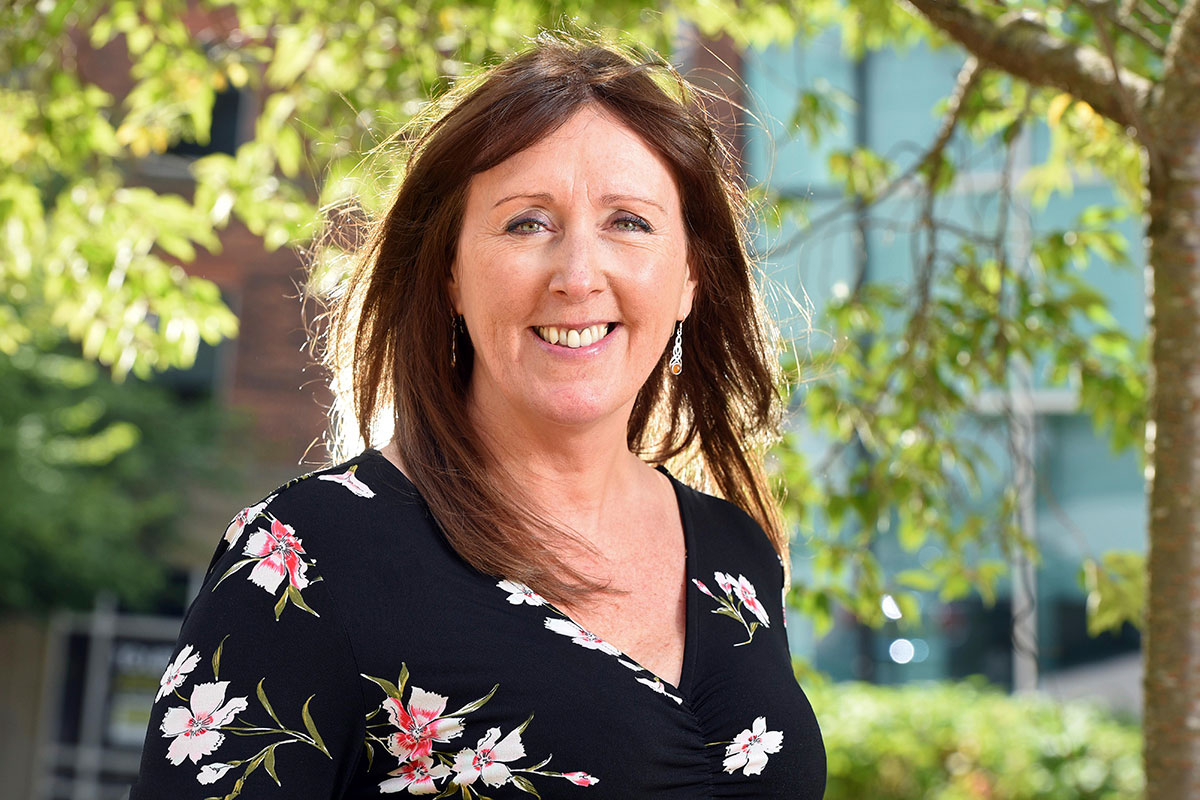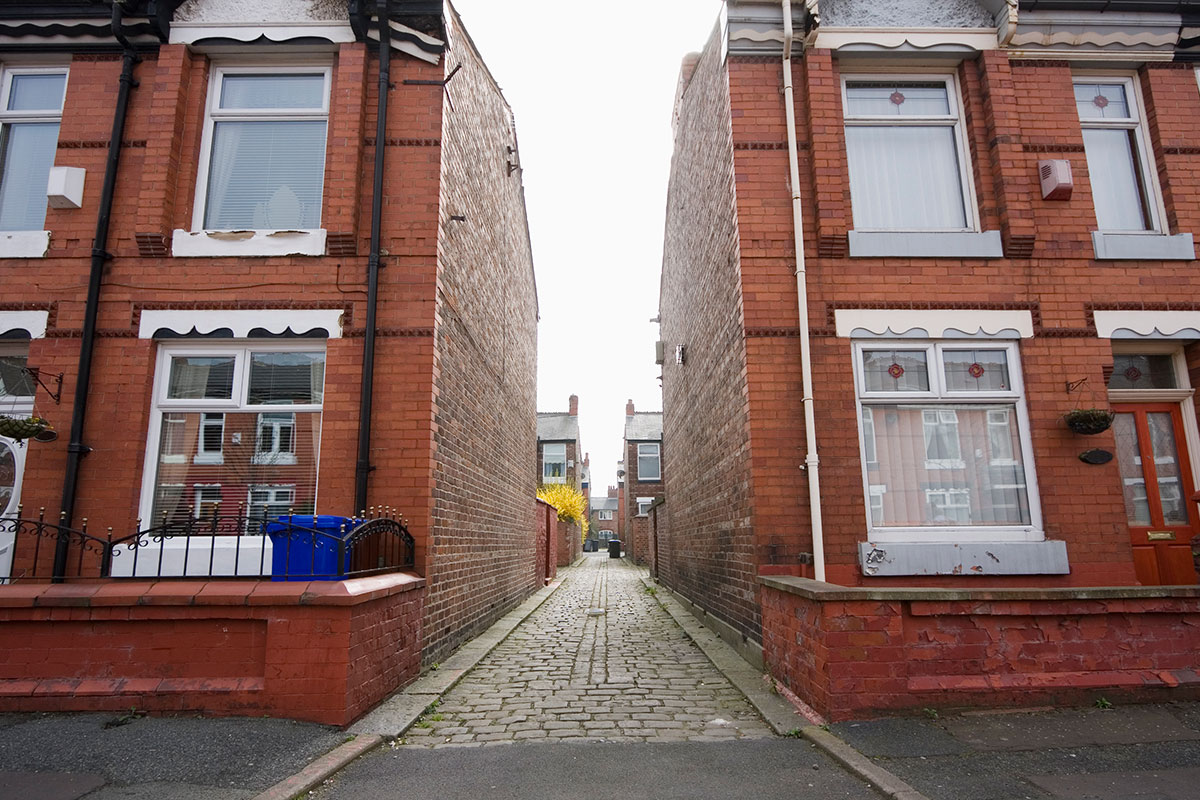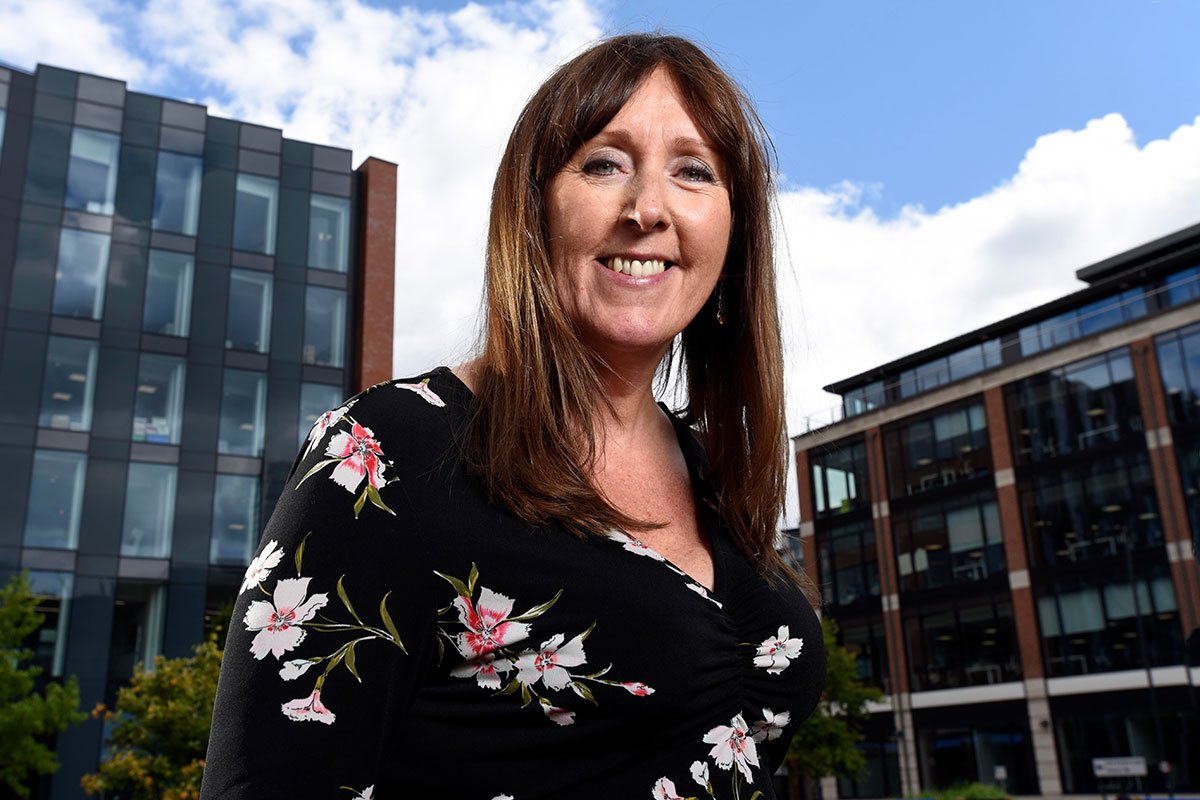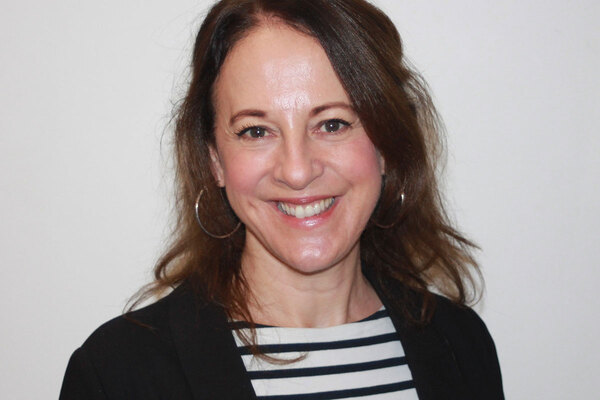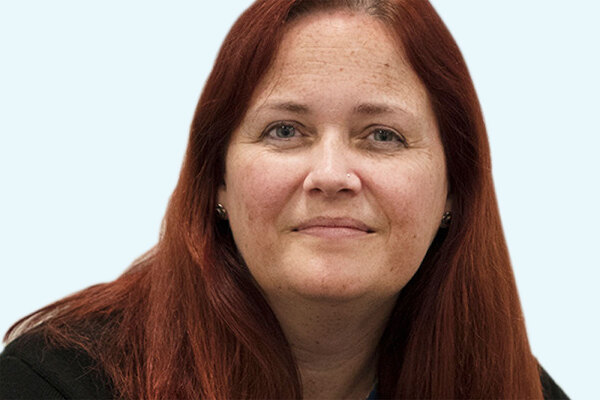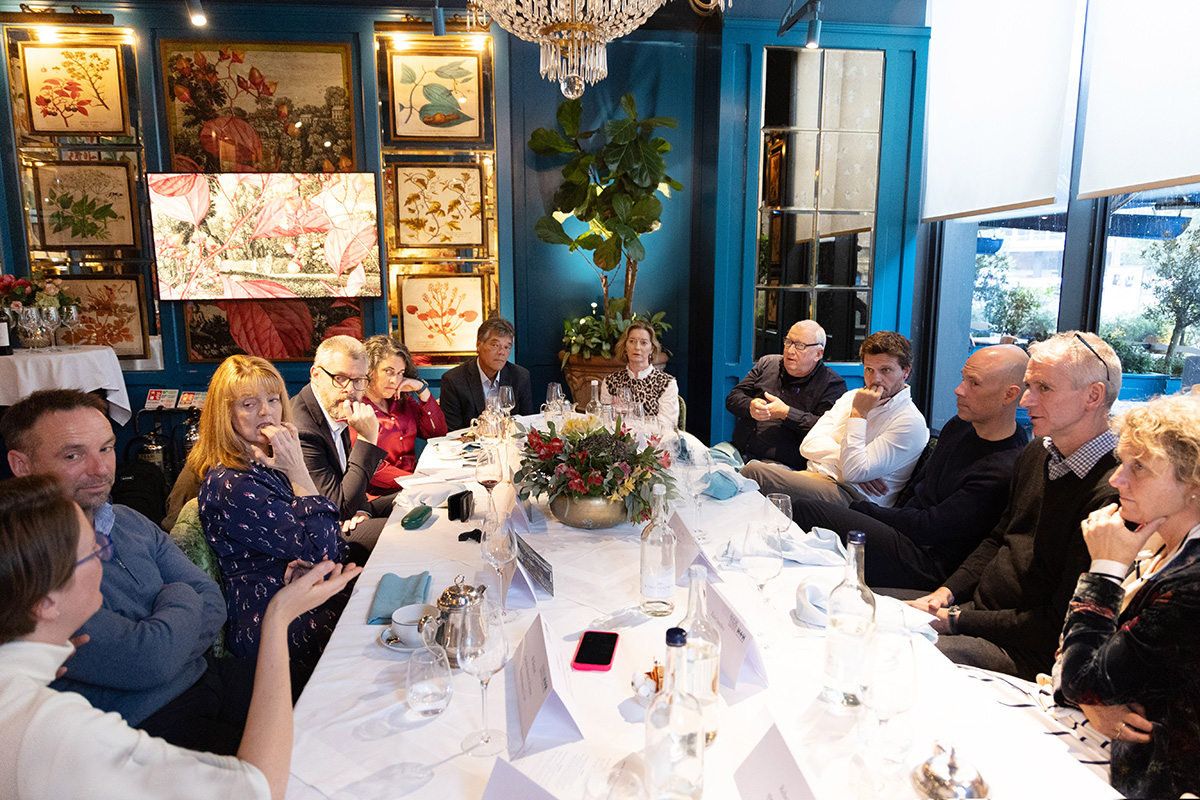New GMHP chair Charlie Norman: ‘We do things differently in Manchester’
Jess McCabe meets Charlie Norman, the new chair of Greater Manchester Housing Providers, to find out about what she is looking to achieve. Photography by Asadour Guzelian
“I love the idea that we do things differently in Manchester and Greater Manchester,” says Charlie Norman, the new chair of Greater Manchester Housing Providers (GMHP). “And I think we do.”
Ms Norman is paraphrasing the famous quote attributed to Tony Wilson, the Hacienda nightclub founder known as Mr Manchester (“This is Manchester, we do things differently here” – although it is actually a quote from a film about his life).
Ms Norman feels that the sentiment applies just as well to GMHP, and how it has become a vehicle for 24 of Greater Manchester’s social landlords to work together for the past 10 years.
Inside Housing sat down over video chat to interview Ms Norman earlier this month, to find out more about the group’s newest chair, what GMHP has been doing and the sort of difference it has made for the organisations to work together.
Coalition of the willing
GMHP has made waves by scaling up the sector’s ambitions in Greater Manchester – including a development joint venture, a multimillion-pound bid for government funding to decarbonise homes and a large Housing First programme.
“It’s really a coalition of the willing. It’s a lot of people doing a lot of really great work on top of their day job and getting their organisations involved,” she says.
That coalition of the willing, to move from a Tony Wilson quote to a George Bush Jr quote (a real one this time), is made up of 24 housing associations, from large players such as Guinness and Jigsaw, to 1,000-home Black and minority ethnic association Arawak Walton. And it includes the 9,000-home association that Ms Norman leads, Mosscare St Vincent’s (MSV).
Ms Norman traces her career in housing back to her school days in Manchester, when she watched a documentary about homelessness that became “etched on my brain”.
She says: “It always really struck me and I remember having loads of conversations with my dad about it. He always said to me that he thought that I would do something like social work. And by that I think he meant this kind of discussion around rough sleeping, and people not having enough money to eat or somewhere to live.”
Ms Norman’s father sadly passed away when she was young. “I’ve always had him on my shoulder, if you like, and I’m wanting to do the best for other people and wanting to hopefully make a small difference in whatever I do.”
“It’s a lot of people doing a lot of really great work on top of their day job and getting their organisations involved”
What this turned out to be was a career in community-focused housing. Starting at Salford Council in the housing department at 21, Ms Norman then went to work with housing co-operatives in Vancouver, Canada, for three years. “I thought they were bloody brilliant,” says Ms Norman. “Completely in charge of their own destiny – small groups of people who built their own homes and manage them and really sort of like an oasis in the midst of some blight in some other areas.”
She came back to England and took a job at Cooperative Development Services (now Plus Dane). There she was working with “30-odd really feisty housing co-operatives that wanted to take charge of their destiny in Merseyside. And it was brilliant working with them”.
She adds: “It took them a while to accept me because I’m from Greater Manchester. Once I was in, it’s a really, really brilliant community to work in. I worked in Toxteth and Dingle and Granby – in all those areas. It was really fantastic.”
When the organisation went into a merger, Ms Norman, who by then had a daughter, took redundancy, and then moved into a management role at Rochdale housing association St Vincent’s. It was, “I love working in that community,” she says. “[I] never had a plan to become a director or chief executive, I just really believed in what we do and always worked really hard. [I just believe in] people having a decent home, and just ended up becoming chief exec when our previous chief exec retired” in 2012. Since then, she has led St Vincent’s into a merger with Mosscare and continued to head up the new organisation, which now stretches across the North West.
Ms Norman took over as chair of GMHP back in March, but she has been involved since the group was set up 10 years ago.
Concrete results
GMHP came together initially to work on poverty in the communities in which the organisations work. It has since developed into a “unique collaboration”, as the organisation puts it.
What began as a formal agreement to work together has since solidified devolution of powers to Greater Manchester and now consists of a ‘tripartite’ formal agreement signed in 2021, to work with the Greater Manchester Combined Authority and healthcare commissioners at the Greater Manchester Health & Social Care Partnership. Through the partnership, the associations work closely with the region’s mayor Andy Burnham.
If that all sounds like a lot of technicalities, consider some of the concrete results: a joint agreement of the 24 associations to build 18,000 homes in the next five years, a £32m joint venture to build market sale homes, a modular housing venture, a joint application of the associations to the Social Housing Decarbonisation Fund, which has resulted in a £10.5m retrofit programme, and a three-year Housing First pilot to house 300 people experiencing homelessness, funded with a central government social impact bond.
“We did a collective bid for the Social Housing Decarbonisation Fund, which was successful, which is great”
The member organisations have promised to set aside specific homes for care-experienced people, veterans of the Armed Forces and homeless people. The group has also produced detailed baseline data on diversity in the organisations.
This way of working, Ms Norman says, has given housing a “seat at the table” for policymaking in the region. “We could rely on Greater Manchester Housing Providers to be a partner and to access things that you probably wouldn’t do as an individual organisation,” she adds.
“We did a collective bid for the Social Housing Decarbonisation Fund, which was successful, which is great.” The programme, she says, will be “very much looking at hard street properties first. So your back-of-pavement terraces, which are going to be really difficult to retrofit”.
As good as this is, obviously it’s only going to cover a fraction of the retrofit work required by the 24 organisations. Ms Norman characterises the mood among GMHP as one of “optimistic realism” on net zero. The group realises the need to act, and sees the opportunity to deal with fuel poverty, couple work with regeneration and create jobs. “But also a bit of realism about how unaffordable it’s going to be, and how much we’ll need grant funding – but also to work together on things like procurement and, you know, creating bases together where we can retrain and rescale rather than working just as individual organisations.”
‘Sticking with the knitting’
Our conversation turns to the disrepair scandals the sector is currently troubled with. “It’s incumbent on all of us to make sure that we put the basics first – to let properties, to do the repairs that people expect us to do within the given timescales. So not very sexy, but it’s actually what we’re there to do,” Ms Norman says.
GMHP, she says, has been “doing loads of work collectively on tenant voice” in preparation for the changes to housing regulation in England that are meant to strengthen protections for tenants. “Like everybody else, [we’re] worried about the Ofsted-style inspections and league tables, which can create a tick-box culture. But I think it’s good. The charter for social housing residents – I picked that up and read it, when it first came out, and I was like, ‘Well, I don’t disagree with any of that.’”
MSV has made changes in response to disrepair scandals that blew up after tenant activists such as Kwajo Tweneboa started amplifying neglected disrepair problems on social media, and ITV News ran a series of high-profile stories about poor conditions faced by tenants. “We’ve had a really good root around any complaints we’ve had, any damp and mould and disrepair claims we’ve had. We’ve been out in force as teams knocking on doors and asking people [if they have had issues],” Ms Norman says.
Ms Norman is careful to point out that landlords should be “sticking with the knitting”, and focused on getting it right, which is itself interesting given the expansive ambitions of GMHP to work across health, care, zero carbon, modular housing and more. But there is a tinge of frustration, in the whole sector being implicated. “What I hear when I’m in rooms with chief execs is that people want to do the right thing. And it’s just dead frustrating. It feels like we’re not quite in control of our own destiny.”
The repercussions are coming back to the sector in policy changes such as the extension of the Right to Buy, she says. “It can lead to policy change, that then can erode precious social housing stock, that has already been massively depleted over the years,” she notes. “[And it can lead to] soured relations with government ministers and departments. None of us want that, because at the end of the day, we all want everybody to be able to live in a decent, warm home. And that sounds really twee to say that, but that is why we do what we do, isn’t it? Because that’s the job.”
“It’s incumbent on all of us to make sure that we put the basics first – to let properties, to do the repairs that people expect us to do”
“We can’t be arrogant, and we’ve got to make sure that we get these things right when they happen,” she adds.
What is GMHP doing to prepare for toughening consumer regulation? “We’re starting to do learning sessions around when something’s gone wrong within one of the providers, what you learn from it, and share together, which I think is going to be invaluable,” Ms Norman says. “We should be learning from each other, shouldn’t we? That’s part of the partnership. It’s not just about what we do with the tripartite agreement. It’s how we behave and support each other, and learn from each other as housing providers.”
It is clear that the new GMHP chair is focused on what you might call a traditional social housing outlook. When Inside Housing asks about her proudest moment, she goes back to a decision that had to be made when Mosscare and St Vincent’s merged five years ago, about what to do with the old Mosscare head office on Great Western Street in Moss Side.
Located in the “heart of the community”, the building had lots of emotional attachments for the local population and the organisation. It was not suitable to be the headquarters of the larger organisation, though. So MSV decided to convert the building into flats that would provide “a place to call home, as long as they want it, for 17 young people leaving the care system”, Ms Norman says.
“Seeing those young people moving in, the hope and ambition, and the dreams that they’ve got for their lives, just seem to have been cemented by that move into those really great flats. And it’s been an absolute pleasure,” she adds.
But Ms Norman clearly feels those 17 flats are emblematic of her approach to housing in general. “I think we made the right decision,” she says.
Sign up for the IH long read bulletin
Already have an account? Click here to manage your newsletters
